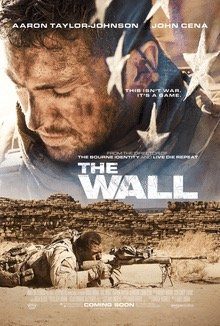“The Confusion and Terror of War”

| None | Light | Moderate | Heavy | |
|---|---|---|---|---|
| Language | ||||
| Violence | ||||
| Sex | ||||
| Nudity |
What You Need To Know:
THE WALL is well-paced and engaging, with superb acting. The images and sounds are hyper-realistic. Despite all that, THE WALL contains several elements for caution. First, the foul language and violence are extreme. Also, the movie is silent about the existential nature of death and what lies beyond. Finally, moral ambiguity reigns. Thus, THE WALL indicts both sides in the Iraqi conflict, setting up a moral equivalency between the two American soldiers and the Muslim sniper. Essentially, the movie takes no stand on right or wrong. In fact, THE WALL seems to enjoy wallowing in the unsatisfying confusion and murkiness of its moral relativism and moral equivalency.
Content:
(HH, PCPC, APAP, FR, LLL, VVV, S, MM) Strong humanist worldview makes a politically correct moral equivalency between American soldiers and Islamist soldiers, plus there’s a brief discussion about the false religious notion that Muslims who die in battle get 72 “virgins” in Heaven; at least 215 obscenities (including 175 or more “f” words) and four strong profanities; graphic gunshot depictions, sniper wounds two soldiers, open wound portrayals, several headshots depicted, images of dead bodies; one sexual reference when two men jokingly refer to a Boys 2 Men lyric saying “I’ll make love to you”; no nudity; no alcohol use; no smoking or drug use; and, some moral relativism and the loss of human life is seen through the fog of war.
More Detail:
As the movie opens, the two soldiers have been observing the site for 20 hours with no sign of any movement. Believing the site secure, Mathews descends down the mountain to investigate. Upon arriving, the situation is not what it seems. Mathews realizes the deaths of the civilians and security team are the work of a sniper. With this realization, he’s hit by a bullet. Isaac races to his rescue, but takes several bullets before being forced to take cover behind a crumbling wall. Separated and badly injured, Mathews and Isaac attempt to fend off the hidden sniper.
THE WALL has many moments of confusion, desperation and terror. It is a war movie that is small in scale but large in its intimate portrayal of soldiers. The camera deliberately invades the personal space of the characters, allowing access to the graphic horrors of war. For example, the camera gives viewers access to Isaac’s personal space as he fights extreme blood loss while being stalked. This gives a claustrophobic feeling to the movie.
There are no references to centers of power in THE WALL, such as meetings with generals, platoon leaders or and political leaders. Director Doug Liman instead focuses on the conflict of two soldiers following orders that, in the shadow of death, seem meaningless. There are few moments for philosophical reflection in the movie. Yet, what is there speaks volumes. Key issues and questions rising from the violent content in THE WALL pertain to the nature of both terrorist and soldier. What defines a soldier? How are they perceived by their family and friends? What defines a terrorist? What makes an enemy?
These questions lay at the heart of THE WALL. Violence and bloodshed – the guaranteed/terrible effects of war – fill the screen of each frame. Lurking in the background of this violence are the questions, “for what” and “for whom.” THE WALL is scant on answers, however.
The events of THE WALL are set in Iraq circa 2007. In that year, President Bush declared victory in the war, which triggered the reconstruction process in Iraq. The oil pipeline that looms large in the opening scene contrasts well with the rubble of the wall where Isaac takes cover. When the Muslim sniper patches himself into Isaac’s radio, the two men discuss economic issues relating to the rebuilding of Iraq are discussed. The answers given by each soldier highlight a fundamental similarity between the two sides. Each man thinks their cause is right and justified. That’s what drives them both to sacrifice their flesh to their cause. However, THE WALL offers no answers to this irony so it can focus on the raw, primal violence both soldiers personally experience.
THE WALL is well-paced and engaging throughout. The acting is superb. The fighting is all too real. The sound design is deep and rich. It is immersive in a way that grants the viewer access to the world of a battlefield.
That said, the movie’s content is excessive. The movie contains excessive violence and language. Gunshot wounds are graphically portrayed. The characters’ use of foul language is pretty much unrestrained. With this content, the movie’s depictions of soldiers are perhaps more a caricature than character.
The other cause for concern pertains to the movie’s apparent Anti-American, humanist political and philosophical message. In leaving the major questions above unanswered, THE WALL relativizes the answers by indicting both sides and by establishing a moral equivalency between the American soldiers and the Islamist sniper. It takes no stand on right or wrong. In addition, its open-ended attitude about the moral nature of terrorism raises the possibility that the American soldiers are just as wrong (if not more so) than the Muslim radicals they’re fighting. Ultimately, THE WALL seems to enjoy wallowing in the confusion and murkiness of this moral relativism and moral equivalency. As a result, the movie is unsatisfying.



